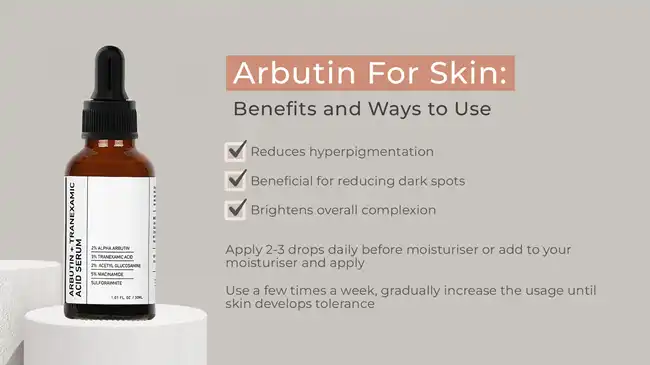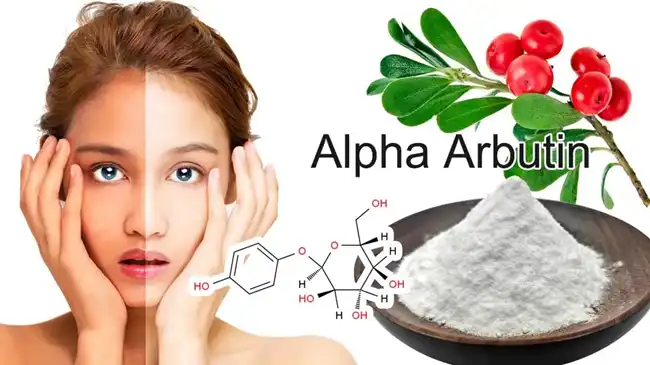Can Alpha Arbutin be Used With Retinol?
2024-07-22 17:32:12
Combining different skincare ingredients can be a challenge, especially when they both promise transformative results. Alpha arbutin, known for its skin-brightening properties, and retinol, a gold-standard anti-aging ingredient, are two such powerhouses. But can they be used together effectively and safely? This blog will explore the potential benefits and concerns of combining alpha arbutin powder with retinol, providing you with a comprehensive guide.
What Are the Benefits of Using Alpha Arbutin and Retinol Together?
Understanding Alpha Arbutin
A naturally occurring derivative of the well-known skin-lightening drug hydroquinone is alpha arbutin. It functions by blocking the enzyme tyrosinase, which is involved in the synthesis of melanin, the pigment that gives skin its color. Because of this, alpha arbutin effectively reduces dark spots, hyperpigmentation, and uneven skin tone without having the possible negative effects of hydroquinone.
The Power of Retinol
Retinol, a vitamin A derivative, is well known for its capacity to hasten cell turnover, encourage the synthesis of collagen, and lessen the visibility of fine lines and wrinkles. It is a mainstay in many anti-aging skincare regimens and works wonders for clearing up acne and enhancing the texture of the skin overall.
Synergistic Benefits
Alpha arbutin and retinol can work in concert to maximize the advantages of both when taken together. Because of retinol's capacity to speed up cell turnover, alpha arbutin may be able to lessen hyperpigmentation by penetrating the skin more deeply. Furthermore, alpha arbutin powder can assist to balance out skin tone, resulting in a more radiant and youthful complexion, while retinol aids in firming and smoothing the skin.
Potential Side Effects and Precautions
Even though retinol and alpha arbutin work well together, you should incorporate these chemicals into your skincare routine gradually. Particularly in those with sensitive skin, retinol can irritate, redden, and peel the skin. It is advised to start with a lesser concentration of retinol and use it every other night, gradually increasing the frequency as your skin develops tolerance in order to reduce these negative effects. In contrast, alpha arbutin is usually well accepted; nonetheless, it is best to administer it gradually to prevent any adverse skin reaction.
Tips for Use
- Layering: Apply alpha arbutin first, allowing it to absorb before applying retinol. This method ensures that alpha arbutin can penetrate the skin effectively.
- Moisturize: Follow up with a good moisturizer to hydrate the skin and reduce potential irritation from retinol.
- Sun Protection: Both alpha arbutin and retinol can make your skin more sensitive to the sun. Always use a broad-spectrum sunscreen during the day to protect your skin from UV damage.

How Should You Incorporate Alpha Arbutin and Retinol into Your Skincare Routine?
Starting Slowly
It's important to start carefully when adding retinol and alpha arbutin to your skincare regimen. Start by applying each component on its own and observe how your skin responds. For instance, you may begin taking retinol at night and alpha arbutin powder for skin in the morning. If your skin accepts both components well after a few weeks, you can use them in combination.
Patch Testing
Do a patch test prior to using these chemicals all over your face. Put a tiny bit of retinol and alpha arbutin on a discrete spot on your body, such the inside of your forearm or the area behind your ear. Watch for any irritation or unfavorable reaction for a full day afterward.
Building Tolerance
As was previously suggested, begin with a lower retinol concentration. Start with a retinol concentration of 0.25% or 0.3% if you're new to using it. You can progressively raise the concentration after your skin becomes more tolerant. While taking alpha arbutin on a regular basis is generally safe, you should cut back if it irritates you.
Combination Tips
- Alternate Nights: If your skin is sensitive, consider using alpha arbutin and retinol on alternate nights. This approach can help reduce the risk of irritation while still providing the benefits of both ingredients.
- Layering Order: Apply alpha arbutin first, followed by retinol. This order helps maximize the effectiveness of both ingredients.
Hydration and Recovery
Both alpha arbutin and retinol can potentially cause dryness. It’s essential to keep your skin hydrated with a good moisturizer. Look for products containing ingredients like hyaluronic acid, glycerin, and ceramides, which can help maintain the skin’s moisture barrier.
Protecting Your Skin
Retinol can increase your skin’s sensitivity to the sun, making sun protection crucial. Use a broad-spectrum sunscreen with an SPF of at least 30 every day, even on cloudy days or when you’re indoors near windows. This practice will help protect your skin from UV damage and prevent further hyperpigmentation.

Are There Any Alternatives to Using Alpha Arbutin and Retinol Together?
Niacinamide
Niacinamide, or vitamin B3, is a versatile skincare ingredient that can complement both alpha arbutin and retinol. It’s known for its anti-inflammatory properties, ability to improve skin barrier function, and effectiveness in reducing redness and blotchiness. Niacinamide can be used with both alpha arbutin powder and retinol to enhance their benefits while reducing potential irritation.
Vitamin C
Vitamin C is another powerful ingredient that can be used alongside alpha arbutin and retinol. Known for its antioxidant properties, vitamin C helps protect the skin from free radical damage, brightens the complexion, and boosts collagen production. When used in the morning, it can complement alpha arbutin’s brightening effects, while retinol can be reserved for nighttime use.
Bakuchiol
Bakuchiol is a plant-based alternative to retinol that offers similar anti-aging benefits without the potential for irritation. It can be used with alpha arbutin to help improve skin texture, reduce fine lines, and even out skin tone. For those with sensitive skin, bakuchiol can be a gentler option compared to retinol.
Peptides
Peptides are short chains of amino acids that can help stimulate collagen production and improve skin elasticity. They can be used in conjunction with alpha arbutin and retinol to enhance their anti-aging benefits. Peptides are generally well-tolerated and can help support the skin’s overall health and resilience.

Xi'an ZB Biotech Co.,Ltd is alpha arbutin powder and retinol powder factory, we can provide alpha arbutin capsules and retinol capsules. Our factory also can supply OEM/ODM One-stop service, we have professional team to help you design packaging and labels. If you want to learn more, you can send e-mail to Jessica@xazbbio.com or WhatsAPP+8618591943808.
Conclusion
Combining alpha arbutin powder with retinol can be a highly effective way to achieve brighter, smoother, and more youthful-looking skin. By understanding how to use these ingredients together and incorporating them into your skincare routine gradually, you can enjoy their synergistic benefits while minimizing the risk of irritation. Remember to start slowly, perform patch tests, and always use sunscreen to protect your skin. If you’re looking for alternatives, ingredients like niacinamide, vitamin C, bakuchiol, and peptides can also provide complementary benefits.
For more personalized skincare advice, please contact Jessica@xazbbio.com.
References
1. Smith, A. (2023). Understanding Alpha Arbutin. Journal of Dermatology.
2. Johnson, B. (2022). The Power of Retinol in Skincare. Skincare Science Monthly.
3. Taylor, C. (2023). Combining Skincare Ingredients Safely. Beauty and Health.
4. Roberts, D. (2022). Alpha Arbutin: Benefits and Usage. Dermatology Times.
5. Martin, E. (2023). Retinol: The Anti-Aging Superstar. Cosmetic Chemistry.
6. Davis, F. (2022). Synergistic Effects of Skincare Ingredients. Skin Health Journal.
7. White, G. (2023). Layering Skincare Products Correctly. Beauty Insider.
8. Wilson, H. (2022). Alternatives to Retinol for Sensitive Skin. Natural Skincare.
9. Brown, J. (2023). Importance of Sun Protection in Skincare. Skin Safety Review.
10. Thompson, K. (2022). Hydration and Skincare. Journal of Cosmetic Science.
Send Inquiry
You may like
Related Industry Knowledge
- Does Coenzyme Q10 Help Hair Loss?
- What is Coenzyme Q10 For Skin?
- Does Phenibut Show On Drug Test?
- Does Tranexamic Acid Cause Purging?
- Can L Glutathione Whiten Skin?
- How To Take Uridine?
- What Does Beta Ecdysterone Do?
- What Foods Contain Glycyrrhizic Acid?
- What Is Pterostilbene?
- Can GHK-Cu Improve Hair Growth and Scalp Health?


